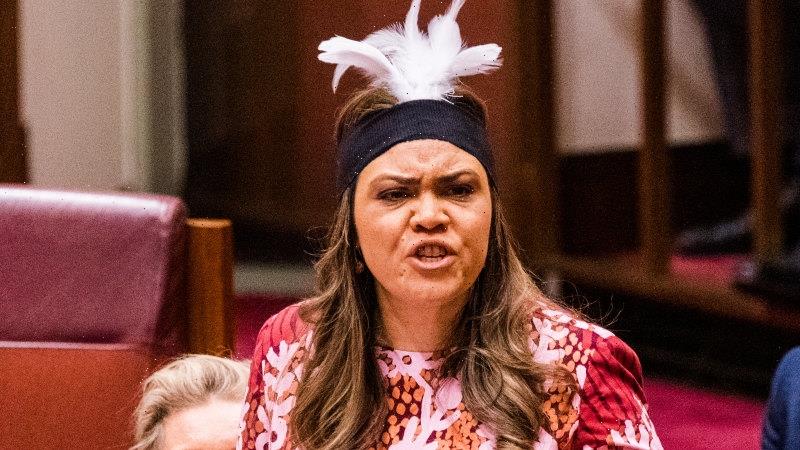A growing rebellion in Liberal Party ranks threatens the federal government’s push for bipartisan consensus on enshrining the Indigenous Voice to parliament in the constitution.
The fierce opposition of new Liberal senator Jacinta Nampijinja Price to a Voice to parliament has prompted three senior Liberals to express grave concerns about the proposal to hold a referendum, which was a key Labor election promise.
Opposition Leader Peter Dutton and Prime Minister Anthony Albanese during a Welcome to Country ceremony to mark the start of the 47th parliament.Credit:Alex Ellinghausen
The division in Coalition ranks comes as Prime Minister Anthony Albanese is due to deliver a major speech at the Garma Indigenous cultural festival in the Northern Territory on Saturday to outline details of Labor’s referendum plans.
The 2017 Uluru Statement of the Heart, which has been endorsed by hundreds of Indigenous leaders, calls for the creation of an Indigenous Voice to parliament, that would provide advice on laws and policies that affect Aboriginal and Torres Strait Islanders.
Shadow Minister for Indigenous Affairs Julian Leeser will on Friday fly to the territory with Albanese, Minister for Indigenous Australians Linda Burney, Attorney-General Mark Dreyfus, Senator Pat Dodson, who is the prime minister’s special envoy for Reconciliation and the Implementation of the Uluru Statement from the Heart, and Northern Territory MPs Malarndirri McCarthy, Luke Gosling and Marion Scrymgour.
But a day after Price delivered a firebrand speech in the Senate that warned an Indigenous Voice to parliament could divide black and white Australia, Liberal shadow spokespeople Tony Pasin, Phillip Thompson and Claire Chandler have all declared that they have serious reservations about the lack of details about the Voice to parliament or the referendum.
Liberal Senator Jacinta Price delivering her first speech in the Senate.Credit:James Brickwood
Price used her first speech to parliament to slam the Voice as a “symbolic gesture” that will not empower Indigenous Australians.
“This government has yet to demonstrate how this proposed Voice will deliver practical outcomes and unite rather than drive a wedge further between Indigenous and non-Indigenous Australia,” Price said.
Thompson, a Queensland MP whose wife, daughters and mother-in-law are all Indigenous, said he had spoken to his family regularly about the proposal but “no one can give me any details”.
“Prime Minister Anthony Albanese today mentioned that he wants everyone to support a Voice to parliament – well, tell us what it is so we can discuss it and I can talk to my family and say ‘will this actually benefit Aboriginal people in this country, or is it virtue signalling?’” he said.
“I took my two daughters into the House today. I want them to have a strong, positive, inclusive future but in the same breath people say support a Voice – but you haven’t told us what it is.”
Pasin, a South Australian MP, said “we don’t know what the proposal is, the first obligation of those pursuing this initiative is to clearly and carefully enunciate in detail what the Voice is, how it will operate and what it proposes to achieve by way of outcomes. Until then, it’s really hard to support”.
“I stand with [Liberal Indigenous senators] Jacinta Price on this and Kerrynne Liddle, outcomes are what matter.”
Chandler, a Tasmanian senator, said she shared Price’s concerns regarding the Voice.
“I think Senator Price gave a fantastic speech with some very important observations and perspectives which deserve to be listened to,” she said.
Just eight of 44 referendums have ever succeeded in Australia and, without a bipartisan consensus in favour of the Voice, the plan to enshrine a Voice in the constitution faces an uphill battle.
While former prime minister Scott Morrison was opposed to a referendum on the Voice, Opposition Leader Peter Dutton has not rejected the possibility of bipartisan support for a Voice and some Liberals, including senator Andrew Bragg have long backed it.
Following her speech on Thursday night, Price told the Herald and The Age she would campaign against the Voice inside the Coalition party room.
Prime Minister Anthony Albanese during a Welcome to Country ceremony at Parliament House on Tuesday.Credit:Alex Ellnghausen
“Yes, I think I will [campaign against it] because as I mentioned in my speech, does it mean then that our elected Indigenous voices within parliament, do we suddenly become redundant? That is the democratic Westminster system … we are a successful nation because of this system.
“Myself and Kerrynne will be very vocal in our positions on these issues. We’ve got a lot of understanding between the two of us.”
In question time on Thursday, Albanese predicted that creating a Voice to parliament and enshrining it in the Constitution was, like the National Apology in 2008, something that “after it happened everyone will wonder why we didn’t do it beforehand” and a chance to recognise in Australia’s “national birth certificate that Australia didn’t begin in 1788”.
“It’s not a matter of doing that or Closing the Gap. It’s not a matter of some symbolism as some people would see it. What it’s a matter of is empowerment. Giving people respect is a first step to overcoming some of the challenges that are there,” he said.
The Uluru Statement from the Heart was endorsed by hundreds of Indigenous leaders and the Voice it proposed would operate as an advisory body to parliamentarians, enabling Aboriginal and Torres Strait Islanders to provide advice on laws and policies that impact them.
Cut through the noise of federal politics with news, views and expert analysis from Jacqueline Maley. Subscribers can sign up to our weekly Inside Politics newsletter here.
Most Viewed in Politics
From our partners
Source: Read Full Article



